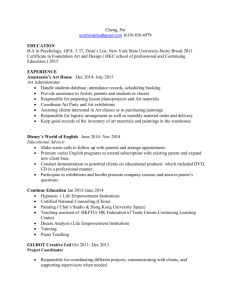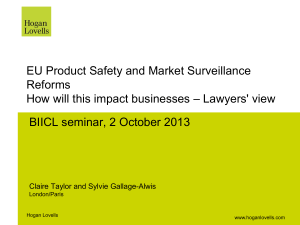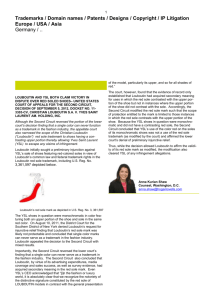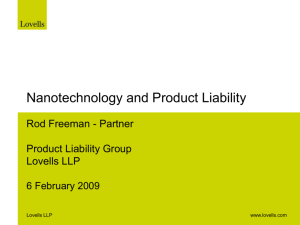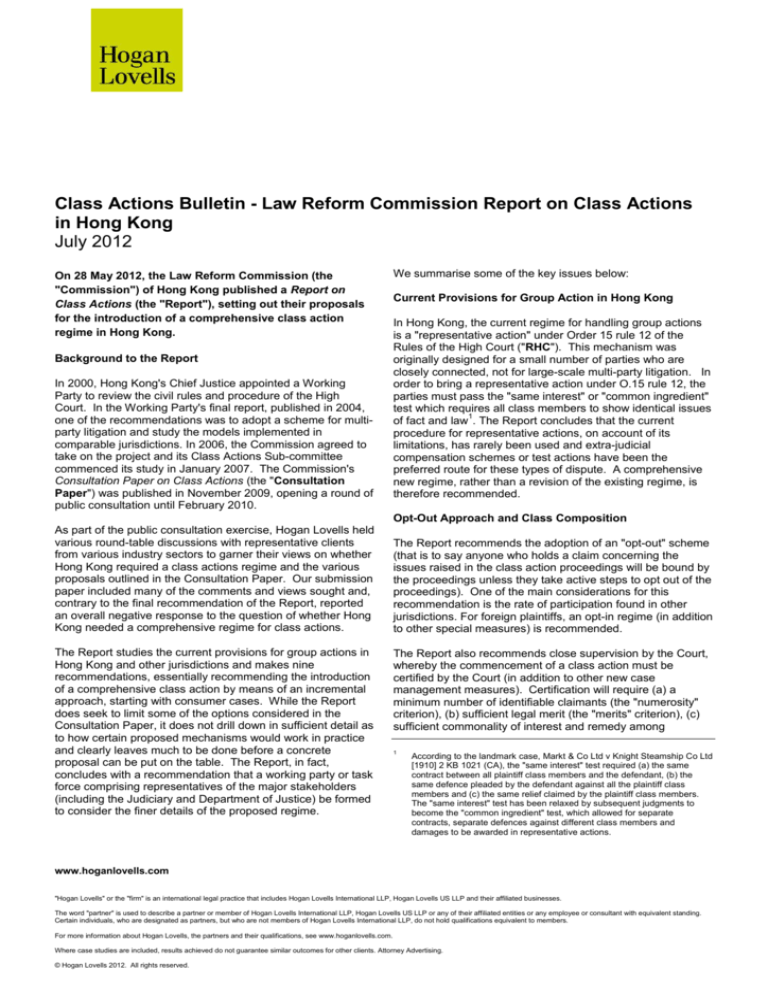
Class Actions Bulletin - Law Reform Commission Report on Class Actions
in Hong Kong
July 2012
On 28 May 2012, the Law Reform Commission (the
"Commission") of Hong Kong published a Report on
Class Actions (the "Report"), setting out their proposals
for the introduction of a comprehensive class action
regime in Hong Kong.
Background to the Report
In 2000, Hong Kong's Chief Justice appointed a Working
Party to review the civil rules and procedure of the High
Court. In the Working Party's final report, published in 2004,
one of the recommendations was to adopt a scheme for multiparty litigation and study the models implemented in
comparable jurisdictions. In 2006, the Commission agreed to
take on the project and its Class Actions Sub-committee
commenced its study in January 2007. The Commission's
Consultation Paper on Class Actions (the "Consultation
Paper") was published in November 2009, opening a round of
public consultation until February 2010.
We summarise some of the key issues below:
Current Provisions for Group Action in Hong Kong
In Hong Kong, the current regime for handling group actions
is a "representative action" under Order 15 rule 12 of the
Rules of the High Court ("RHC"). This mechanism was
originally designed for a small number of parties who are
closely connected, not for large-scale multi-party litigation. In
order to bring a representative action under O.15 rule 12, the
parties must pass the "same interest" or "common ingredient"
test which requires all class members to show identical issues
1
of fact and law . The Report concludes that the current
procedure for representative actions, on account of its
limitations, has rarely been used and extra-judicial
compensation schemes or test actions have been the
preferred route for these types of dispute. A comprehensive
new regime, rather than a revision of the existing regime, is
therefore recommended.
Opt-Out Approach and Class Composition
As part of the public consultation exercise, Hogan Lovells held
various round-table discussions with representative clients
from various industry sectors to garner their views on whether
Hong Kong required a class actions regime and the various
proposals outlined in the Consultation Paper. Our submission
paper included many of the comments and views sought and,
contrary to the final recommendation of the Report, reported
an overall negative response to the question of whether Hong
Kong needed a comprehensive regime for class actions.
The Report studies the current provisions for group actions in
Hong Kong and other jurisdictions and makes nine
recommendations, essentially recommending the introduction
of a comprehensive class action by means of an incremental
approach, starting with consumer cases. While the Report
does seek to limit some of the options considered in the
Consultation Paper, it does not drill down in sufficient detail as
to how certain proposed mechanisms would work in practice
and clearly leaves much to be done before a concrete
proposal can be put on the table. The Report, in fact,
concludes with a recommendation that a working party or task
force comprising representatives of the major stakeholders
(including the Judiciary and Department of Justice) be formed
to consider the finer details of the proposed regime.
The Report recommends the adoption of an "opt-out" scheme
(that is to say anyone who holds a claim concerning the
issues raised in the class action proceedings will be bound by
the proceedings unless they take active steps to opt out of the
proceedings). One of the main considerations for this
recommendation is the rate of participation found in other
jurisdictions. For foreign plaintiffs, an opt-in regime (in addition
to other special measures) is recommended.
The Report also recommends close supervision by the Court,
whereby the commencement of a class action must be
certified by the Court (in addition to other new case
management measures). Certification will require (a) a
minimum number of identifiable claimants (the "numerosity"
criterion), (b) sufficient legal merit (the "merits" criterion), (c)
sufficient commonality of interest and remedy among
1
According to the landmark case, Markt & Co Ltd v Knight Steamship Co Ltd
[1910] 2 KB 1021 (CA), the "same interest" test required (a) the same
contract between all plaintiff class members and the defendant, (b) the
same defence pleaded by the defendant against all the plaintiff class
members and (c) the same relief claimed by the plaintiff class members.
The "same interest" test has been relaxed by subsequent judgments to
become the "common ingredient" test, which allowed for separate
contracts, separate defences against different class members and
damages to be awarded in representative actions.
www.hoganlovells.com
"Hogan Lovells" or the "firm" is an international legal practice that includes Hogan Lovells International LLP, Hogan Lovells US LLP and their affiliated businesses.
The word "partner" is used to describe a partner or member of Hogan Lovells International LLP, Hogan Lovells US LLP or any of their affiliated entities or any employee or consultant with equivalent standing.
Certain individuals, who are designated as partners, but who are not members of Hogan Lovells International LLP, do not hold qualifications equivalent to members.
For more information about Hogan Lovells, the partners and their qualifications, see www.hoganlovells.com.
Where case studies are included, results achieved do not guarantee similar outcomes for other clients. Attorney Advertising.
© Hogan Lovells 2012. All rights reserved.
members of the class (the "commonality" criterion), (d) that a
class action be the most appropriate legal vehicle to resolve
the issues in dispute (the "superiority" criterion) and (e) that
the representative plaintiff have the standing and ability to
represent the interests of the class of claimants both properly
and adequately (the "adequacy of the representative"
criterion).
Choice of Plaintiff, Costs and Funding
One of the main factors in the effectiveness of a class action
regime is who will pay for it. Hong Kong generally applies the
rule that costs follow the event and, unlike some other
jurisdictions, the laws of maintenance and champerty (which
generally prohibit strangers to litigation from providing funding)
still apply in Hong Kong.
It is a feature of some class action regimes that, if the class
loses, members of the class will not be subject to costs
consequences – these are borne by the representative
plaintiff. However, in order to avoid potential abuse whereby
an impecunious class member is deliberately chosen as the
representative plaintiff (so as to avoid any adverse costs
consequences), the Report recommends empowering the
courts to order security for costs to protect defendants from
such abuse. In addition, the ability to show adequate funding
may form part of the certification criteria outlined above.
As to funding, truly impecunious plaintiffs should have access
to discretionary funding and legal aid is recommended to be
made available for class actions – but only to the same extent
as if they were pursuing a personal action. However, the part
of the total common fund costs attributable to them should be
disaggregated, and class members who are not legally aided
should share, equitably, the costs. In the long term, the
Report recommends establishing a class action fund ("CAF")
to make discretionary grants to eligible plaintiffs. While the
CAF would require seed money for its establishment, it would
be intended to be self-funded with plaintiffs being required to
reimburse the CAF from proceeds recovered from
defendants. In the short term, funding should be made
available by increasing the scope of the existing Consumer
Legal Action Fund, which was set up in 1994 to provide
greater consumer access to legal remedies run by the
Consumer Council, to include class action cases.
The Report recommends against revisions in the law to allow
contingency funding and litigation funding companies
(commercial organisations that fund litigation for profit) to
operate. It concludes that the community at large does not
accept the idea of funding litigation for profit.
Other Recommendations
An incremental approach is recommended for the introduction
of the new regime. In simple terms, this means that, initially,
the High Court only will be empowered to hear class action
claims, with the District Court's jurisdiction deferred for five
years, while the High Court builds its experience. The Small
Claims Tribunal should not be empowered to hear class
action proceedings.
The other aspect that is to be incrementally introduced is that
class actions should only apply to "consumer" cases at the
outset. The term "consumer cases" is explained as "tortious
and contractual claims made by consumers in relation to
goods, services and immovable property" and the Report
recommends applying existing definitions under Consumer
Council Ordinance (Cap. 216) – accordingly, this will cover a
substantial number of the target disputes. The Report further
seeks to rely on the Unconscionable Contracts Ordinance
(Cap. 458), whereby whether or not a party deals as a
consumer depends on the individual circumstances of each
transaction, not the party itself, and by reference to the
Consumer Council Ordinance (Cap. 216).
Moving Forward
The introduction of a class action regime in Hong Kong is not
imminent, as the findings of the Report will still require further
detailed study before any suitable legislation can be put
forward for discussion. However, with Hong Kong's new Chief
Executive coming into office on 1 July 2012 and the potential
winds of change upon which his "grass roots" election
platforms were based, these reforms granting the public
greater access to justice may receive earlier scrutiny than
previously expected.
The full Report may be accessed at
http://www.hkreform.gov.hk/en/publications/rclassactions.htm
If you would like further information on any aspect of
this note please contact a person mentioned below or
the person with whom you usually deal:
Allan Leung, Partner
allan.leung@hoganlovells.com
+852 2840 5061
Mark Lin, Partner
mark.lin@hoganlovells.com
+852 2840 5091
Chris Dobby, Partner
chris.dobby@hoganlovells.com
+852 2840 5629









